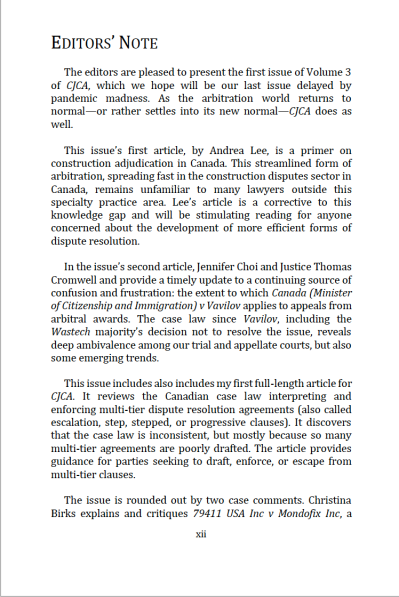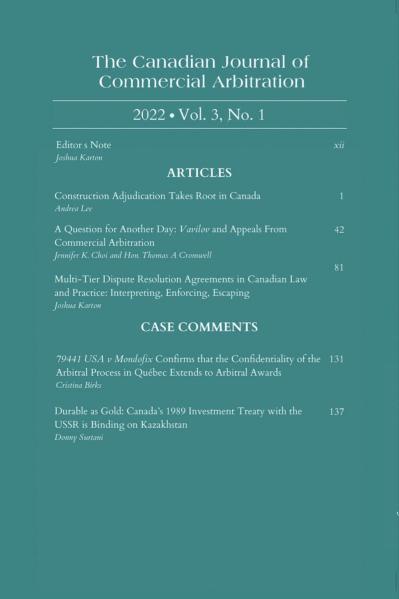Construction Adjudication Takes Root in Canada

- Author
- Andrea Lee
- Pages
- 1 – 41
- Introduction
- Construction is a dynamic industry governed by multiple tiers of complex contracts and relationships. In Canada, construction employs 1.4 million people and generates $147.5 billion annually. It accounts for 7.5 per cent of the nation’s gross domestic product (GDP), fourth behind real estate, manufacturing, and mining, oil, and gas. Essential services are provided by a myriad of design professionals, contractors, trades, and suppliers, working together to create the built form—and, along the way, dealing with project budgets and schedules and the myriad of changes that arise in the course of projects. Measures such as liquidated damages and guaranteed maximum price and back-to-back liability provisions have become standard as performance incentives or pressure points, depending on one’s perspective.
A Question for Another Day: Vavilov and Appeals From Commercial Arbitration
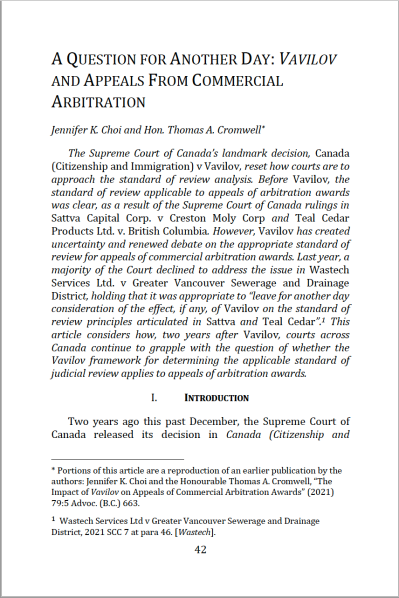
- Author
- Jennifer K. Choi and Hon. Thomas A. Cromwell
- Pages
- 42-80
- Abstract
- The Supreme Court of Canada’s landmark decision, Canada (Citizenship and Immigration) v Vavilov, reset how courts are to approach the standard of review analysis. Before Vavilov, the standard of review applicable to appeals of arbitration awards was clear, as a result of the Supreme Court of Canada rulings in Sattva Capital Corp. v Creston Moly Corp and Teal Cedar Products Ltd. v. British Columbia. However, Vavilov has created uncertainty and renewed debate on the appropriate standard of review for appeals of commercial arbitration awards. Last year, a majority of the Court declined to address the issue in Wastech Services Ltd. v Greater Vancouver Sewerage and Drainage District, holding that it was appropriate to “leave for another day consideration of the effect, if any, of Vavilov on the standard of review principles articulated in Sattva and Teal Cedar”. This article considers how, two years after Vavilov, courts across Canada continue to grapple with the question of whether the Vavilov framework for determining the applicable standard of judicial review applies to appeals of arbitration awards.
Multi-Tier Dispute Resolution Agreements in Canadian Law and Practice: Interpreting, Enforcing, Escaping
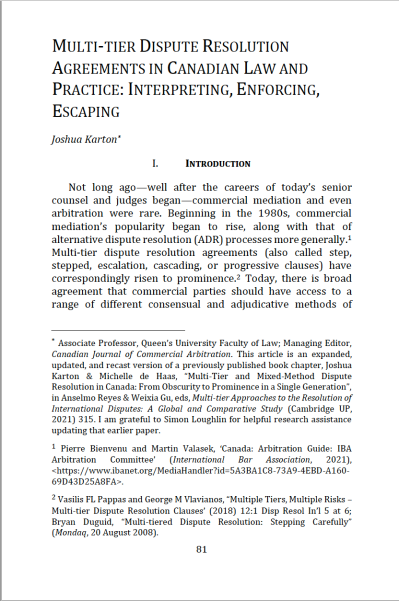
- Author
- Joshua Karton
- Pages
- 81 – 130
- Introduction
- Not long ago—well after the careers of today’s senior counsel and judges began—commercial mediation and even arbitration were rare. Beginning in the 1980s, commercial mediation’s popularity began to rise, along with that of alternative dispute resolution (ADR) processes more generally. Multi-tier dispute resolution agreements (also called step, stepped, escalation, cascading, or progressive clauses) have correspondingly risen to prominence. Today, there is broad agreement that commercial parties should have access to a range of different consensual and adjudicative methods of dispute resolution, and indeed are entitled to mix and match them in order to best fit the characteristics of their transaction or their dispute. Dispute resolution agreements with two or more tiers, typically negotiation and/or mediation then arbitration or litigation, are now a common feature of commercial contracts. Many parties find that these combine the best features of consensual dispute resolution (efficiency, flexibility, preservation of the contractual relationship) with the hard backstop of binding adjudication by a judge or arbitrator.
79441 USA v Mondofix Confirms that the Confidentiality of the Arbitral Process in Québec Extends to Arbitral Awards
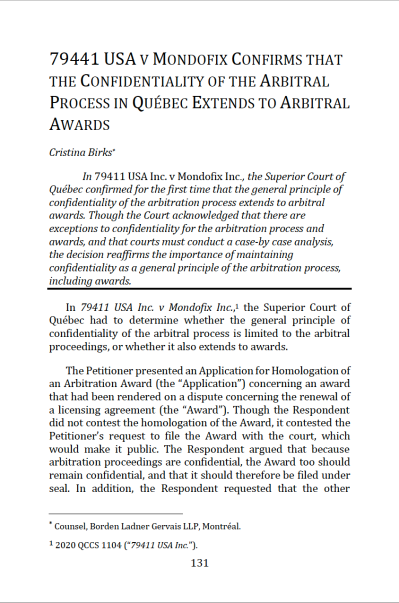
- Author
- Cristina Birks
- Pages
- 131 – 136
- Abstract
- In 79411 USA Inc. v Mondofix Inc., the Superior Court of Québec confirmed for the first time that the general principle of confidentiality of the arbitration process extends to arbitral awards. Though the Court acknowledged that there are exceptions to confidentiality for the arbitration process and awards, and that courts must conduct a case-by case analysis, the decision reaffirms the importance of maintaining confidentiality as a general principle of the arbitration process, including awards.
Durable as Gold: Canada’s 1989 Investment Treaty with the USSR is Binding on Kazakhstan
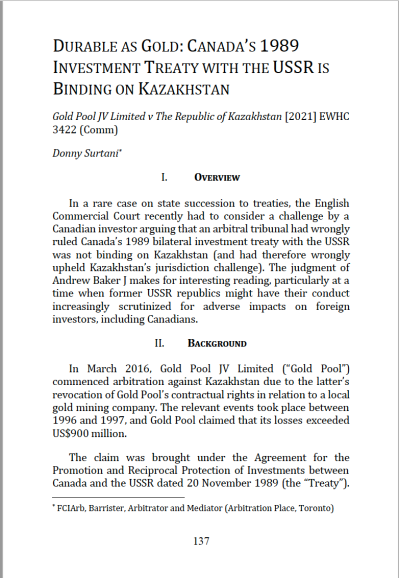
- Author
- Donny Surtani
- Pages
- 137 – 143
- Abstract
- In a rare case on state succession to treaties, the English Commercial Court recently had to consider a challenge by a Canadian investor arguing that an arbitral tribunal had wrongly ruled Canada’s 1989 bilateral investment treaty with the USSR was not binding on Kazakhstan (and had therefore wrongly upheld Kazakhstan’s jurisdiction challenge). The judgment of Andrew Baker J makes for interesting reading, particularly at a time when former USSR republics might have their conduct increasingly scrutinized for adverse impacts on foreign investors, including Canadians.

